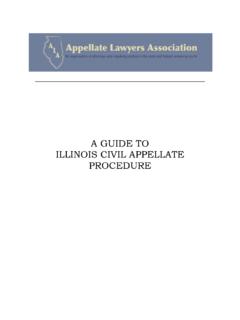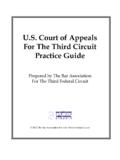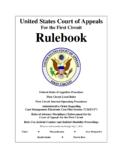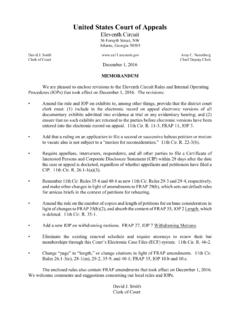Transcription of An Attorney s Guide to Beginning the Appellate Process
1 YourOnlineProfe ssor .net An Attorney s Guide to Beginning the Appellate Process Created a nd P resented by Paul Fellman, 5/22/2017 - All Rights Reserved. 1 An Attorney s Guide to Beginning the Civil Appellate Process In Pennsylvania Created and Presented by Paul Fellman, I. A Brief Overview of the Pennsylvania Judicial System A. The Courts of Common Pleas 1. The Courts of Common Pleas are the primary trial court system in the Commonwealth, the vast majority of trials are conducted before these courts. 2. Unless original jurisdiction is specifically granted to another court, the Courts of Common Pleas have unlimited original jurisdiction of all actions and 3. In some circumstances, the Courts of Common Pleas may share concurrent jurisdictio n with other courts, including the Commonwealth Court and the Magisterial Courts. 4. The Courts of Common Pleas also have exclusive jurisdiction of appeals from final orders of the minor judiciary and, unless otherwise provided, appeals from final orders of government agencies, including: determinations of: the Department of Health in connection to birth records; the Department of Transportation; the Workers Compensation Appeal Board; the Pennsylvania Liquor Control Board; the Department of Revenue; and the Department of Labor and Industry or the Department of B.
2 The Magisterial Courts 1. Magisterial Courts are considered minor courts of the Commonwealth. 2. Magisterial District Judges are not required to be members of the bar of the Supreme Court. 3. With regard to civil matters, the Magisterial Courts have jurisdiction over actions arising under the Landlord and Tenant Act of 1951, and claims not exceeding $12,000 (exclusive of interest and costs).3 I. Civil Appeals to the Superior Court A. Generally 1. The Superior Court has jurisdiction over all orders of the courts of common pleas unless otherwise provided for in Chapter 7 of 42 Judiciary and Judicial 2. Cases not falling within the jurisdiction of the Superior Court will be heard by either the Supreme Court or the Commonwealth Court. 3. The Superior Court hears appeals of all criminal,5 domestic relations,6 commercial,7 and those tort actions not involving a governmental party.
3 1 42 931. 2 42 933. 3 42 1515. 4 42 742. 5 Title 18 of the Pennsylvania Consolidated Statutes. 6 Title 23 of the Pennsylvania Consolidated Statutes. 7 Title 13 of the Pennsylvania Consolidated Statutes. 2 4. Appeals may also be taken as of right from certain orders of the Orphans Court B. Final Orders and Appeals as of Right Trial court orders are either interlocutory or final. The distinction is an important one to make and will, in most cases, control whether or not an appeal is appropriate or even allowed. 1. Except as prescribed by Rule 341 of the Rules of Appellate Procedure, an appeal may be taken as of right from any final order of the court of common a. A final order is any order that: i. Disposes of all claims and of all parties; or ii. Is expressly defined as a final order by statute;10 or iii. Is entered as a final order pursuant to 341 (c).
4 11 b. Whether or not the order is final affects the order s appealability and directly implicates the Superior Court s jurisdiction over the c. In order to be final and appealable, the order must dispose of all claims and all Amendments to Rule 341 in 1992 generally eliminated appeals as of right from orders not ending the litigation as to all claims and as to all The Notes to Rule 341 set forth examples of orders which are no longer appealable as final They include: i. a decision transferring an equity action to the law side; ii. an order denying a defendant leave to amend his answer to plead an affirmative defense; iii. a pre-trial order refusing to permit a defendant to introduce evidence of an affirmative defense; iv. an order denying a party the right to intervene; v. an order denying a petition to amend a complaint; vi. an order requiring withdrawal of counsel; vii.
5 An order denying class certification in a class action case; and viii. an order striking a lis pendens. 8 These orders include: (1) an order confirming an account, or authorizing or directing a distribution from an estate or trust; (2) an order determining the validity of a will or trust; (3) an order interpreting a will or a document that forms the basis of a claim against an estate or trust; (4)) an order interpreting, modifying, reforming or terminating a trust; (5) an order determining the status of fiduciaries, beneficiaries, or creditors in an estate, trust, or guardianship; (6) an order determining an interest in real or personal property; (7) an order issued after an inheritance tac appeal has been taken to the Orphans ; (8) an order otherwise appealable as provided by Chapter 3 of the Rules of Appellate Procedure.
6 See, 342. 9 341 (a). 10 See , Rule 910. 11 341 (b). 12 Angelicho v. Myers, 110 1046, 1048 (Pa. Super. Ct. 2015) (citing Mother s Restaurant Inc. v. Krystkiewicz, 861 327, 331 (Pa. Super. Ct. 2004)). 13 341 (b) (1). 14 Notes to 341. 15 These orders may be appealable under Rule 312 (interlocutory appeals by permission) or 313 (collateral orders). 3 d. Accordingly, unless otherwise permitted to appeal under Rule 312 or 313, a party unwillingly dismissed from an action will have to wait until the remaining claims and parties are disposed of before she can proceed to have the trial court s order 2. Determination of Finality Pursuant to Rule 341 (c). Rule 341 (c) provides an opportunity for immediate Appellate relief to those parties affected by an order which is not otherwise immediately appealable due to lack of finality. a. When more than one claim for relief is presented in an action, whether as a claim, counterclaim, cross-claim, or third-party claim or when multiple parties are involved, the trial court may enter a final order as to one or more but fewer than all of the claims and b.
7 The Superior Court has held that trial courts should find that an immediate appeal from a non-final order is appropriate in only the most extraordinary c. When proceeding pursuant to Rule 341 (c), the trial court must make an express determination that an immediate appeal will facilitate resolution of the entire d. An order of finality pursuant to Rule 341 (c) becomes appealable when e. A decision not to seek determination of finality will not act as a waiver of the issue and the matter may be raised in a subsequent appeal following entry of a final order disposing of all claims and all 3. How to Proceed under Rule 341 (c). a. The trial court is unlikely to act on its own to determine that an order is final pursuant to Rule 341 (c). b. The party seeking the determination will have to make an application to the court for a determination of finality. i. The specific filing can be titled, Application for Determination of Finality Pursuant to 341 (c).
8 Ii. The Application should also set forth the averments in numbered paragraphs and be accompanied by a brief in support. iii. Under relief requested, the filing party should ask that the court amend the order in question to include a provision stating that the order is a final order pursuant to 341 (c) and that an immediate appeal will facilitate the resolution of the entire case. iv. While these are generally accepted practices, you should always consult your local rules of practice to first determine whether your jurisdiction has established its own procedure for filing an Application for Determination of Finality. 16 See, Angelichio v. Myers, 110 1046 (Pa. Super. Ct. 2015) (quashing appeal from trial court s order entering default judgment against appellant). 17 341 (c). 18 Bailey v. RAS Auto Body, Inc., 85 1064, 1069 (Pa. Super. Ct. 2014) (citing Robert H.)
9 McKinney, Jr., Assocs., Inc. v. Albright, 632 937, 939 (Pa. Super. Ct. 1993)). 19 341 (c). 20 341 (c). 21 Notes to 341. 4 c. In ruling on an Application for Determination of Finality, the trial court must consider four factors set forth in the Notes to Rule Accordingly, it is important that your Application include an analysis of the required factors. The factors are: i. Whether there is a significant relationship between adjudicated and unajudicated claims; ii. Whether there is a possibility that an appeal would be mooted by further developments; iii. Whether there is a possibility that the court will consider issues a second time; iv. Whether an immediate appeal will enhance prospects of d. The trial court is required to act on the Application within 30 days of entry of the The rule does not explicitly state that the Application must be filed within a certain number of days from the entry of the order at issue, but the requirement that the trial court act on an Application within 30 days from the date of that order implies that the Application should be filed shortly (a few days) after the order.
10 E. During the time an Application is pending the action is If the trial court fails to act on the Application within 30 days of entry of the order, the trial court will no longer be permitted to consider the application and it will be deemed 4. If the Application is Denied or Deemed Denied. a. Any denial of an Application is reviewable only for abuse of b. A party dissatisfied with the trial court s denial of the Application may file a petition for review with the Superior Court, but must do so within 30 days from the date on which the order denying the Application is entered or deemed 5. If the Application is Granted. If the trial court grants your Application, then you must file your Notice of Appeal with the trial court within 30 days after entry of the order as amended. C. Interlocutory and Collateral Orders 1. Interlocutory Orders. a. Interlocutory orders are those orders of the trial courts which do not constitute a final resolution of the whole b.










